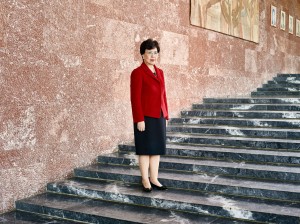Missing In Action
< < Go Back
by Vivienne Walt,
Why the World Health Organization failed to stop Ebola
In March, a Blurry photograph appeared on a news website in the West African nation of Guinea. The image showed two women in a remote village lying on grass mats, while several men stood over them wondering what illness had struck their loved ones. The women were dying. The news site quoted the village nurse as saying the mystery killer was “extremely serious.”
More
Ebola Nurse: Christie’s Quarantine Order ‘An Abundance of Politics’Dallas Nurse Who Beat Ebola Gets Her Dog BackEarly Winter Blast: Snow and Winds Slam New England NBC NewsBreathe In, Breathe Out: Runners Race in NYC Marathon NBC News’Severe’ and ‘Irreversible’: U.N. Report Warns of Climate Dangers NBC News
But the mystery was soon solved. Officials working for the United Nations’ World Health Organization (WHO) in the Guinean capital of Conakry announced that tests had shown the women in the village had become infected by the deadly Ebola virus. It took more than a week for the news of the re-emergence of Ebola to make its way from the dirt-poor African village to Guinea’s health officials, then to the local WHO office and finally to the Swiss city of Geneva, in the foothills of the Alps, where it reached WHO Director-General Margaret Chan.
By then, Ebola had been spreading for at least three months and had already killed dozens of people in Guinea. The virulent infectious disease was on its way to crossing into Sierra Leone, Liberia, Senegal and Nigeria before jumping continents for the first time ever, to the Spanish capital of Madrid and then the U.S. cities of Dallas and New York. It was the kind of nightmare scenario that until then had been the stuff of Hollywood thrillers.
Seven months later, Ebola has killed at least 4,922 people. The true figure could be even higher–experts say many deaths from Ebola go unreported–and new outbreaks could be just a plane flight away.
it’s tempting to see a world united against the disease. But it hasn’t always been this way. The virus was able to cross oceans and worm its way into big cities thanks in good part to entrenched bureaucracy in West Africa and abroad, years of rich countries penny-pinching on global health spending and a failure of leadership at WHO.
“Outbreak control is our bread and butter,” Chan says. Yet this one, she says, “outstripped WHO’s capacity to respond.”
f WHO is getting the bulk of the blame, that’s because its very purpose is to prevent catastrophes like this from happening. That failure seems even more glaring now, since the Ebola outbreak was WHO’s “moment to shine,”
Yet WHO laid off 1,000 staff members in 2010–including some of the same people who might have helped stop Ebola from spreading–and halved its budget for outbreak and response to a meager $114 million this year.
Yet funding is not Chan’s only challenge. Under the organization’s decentralized structure, WHO regional offices have great autonomy. Officials at the headquarters in Geneva have regularly butted heads with some of them, according to Garrett at the Council on Foreign Relations. “In some cases the regional offices have ignored policies from Geneva and openly contested headquarters’ budgets,” she says. Regional directors have virtually unchecked authority in their domains, and while some are very effective, others can do more harm than good in a crisis.
Chan says she cannot be “a one-issue director-general.” She tells TIME that as serious as Ebola is, she is also currently dealing with many other infectious outbreaks, including Middle East Respiratory Syndrome and the Marburg virus in Uganda. Chan flew to Moscow in October to attend a conference on smoking and told a journalist there, “Ebola is important, but there are other important issues, like tobacco control.”
Chan, much like Gostin, believes true change will require billions more dollars from governments to establish a permanent emergency fund to fight unexpected health crises like Ebola. She’d like to set up an army of trained doctors and nurses to deploy at short notice, much like U.N. Peacekeeping, which deploys soldiers from various countries in crises across the world. Chan makes the case for bolstering WHO, saying climate change and mass migration could make outbreaks of deadly epidemics like Ebola more frequent. “Countries will need to ask themselves, Are we prepared to invest in global security?” Chan says. “Ebola has to be a turning point.”
More From TIME Magazine:




